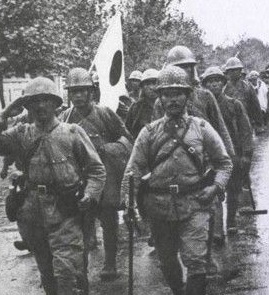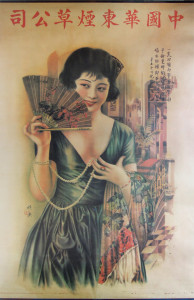Impressions of Shanghai, 1937 (II)
- By Peter Harmsen
- 31 August, 2013
- 16 Comments
 Best Overend (1909-1977) visited Shanghai in 1937, just before the city descended into war and chaos. He encountered an alien, millennia-old Chinese world, but with elements of a much more familiar western culture. On the fringes loomed the Japanese empire, its soldiers already behaving as the masters of the ancient country.
Best Overend (1909-1977) visited Shanghai in 1937, just before the city descended into war and chaos. He encountered an alien, millennia-old Chinese world, but with elements of a much more familiar western culture. On the fringes loomed the Japanese empire, its soldiers already behaving as the masters of the ancient country.
What follows is the second of three installments of Overend’s Shanghai memoirs. It is an edited extract from Tramp to Shanghai: a young man’s tale before the war, by Best Overend and Tronn Overend available as a free iBook from the iTunes store. The extract was first carried in the November, 2012 issue of Quadrant magazine (www.quadrant.org.au) and is reproduced here with the kind permission of Quadrant and Best Overend’s son Tronn Overend. Place names are given in their modern form.
Along the Suzhou Creek there is an unfresh smell. The coloured men spit great gouts along the roadways and across the bridges. The dust swirls up into your nostrils, and you hold your mouth tightly closed, trying to breathe when you are momentarily away from passing people. The yellow men and women lean on their long bamboo poles, stuck into the mud, walking back along their barges, as they nose slowly upstream. They carry great balks of timber, sacks of cement and other building materials. Then they come down with the current, loaded with country products to be sold in the Hongkou market. In this market, the other day, a Japanese soldier raped a fourteen year old Chinese child. When a white policeman came up with his revolver to put an end to the business, four other Japanese soldiers appeared and held their bayonets against the white man’s back. The public rape went on. Nothing could be done about it. Although officially international, the territory was controlled by the little yellow people and their military men.
Just below the Garden Bridge, and the grounds of the British Consulate, the Suzhou Creek runs away into the yellow flood of the Huangpu. This river sometimes comes down quite quickly, so that you can see a 20,000 ton liner swing almost helplessly in midstream. Then the sampans sweep down very quickly as the boatmen push out and start their twirling sweep. The white grey warships lie just off the Bund, which follows the river. The banks and offices are only separated from these warships by the rickshaws, the old trams, the quickly moving cars and the few yards of yellow water. The Chinese scavenger boats are fond of the warships. These have the habit of saving all their rubbish, for the last few days at sea, in order that they are able to discharge into Shanghai waters for the scavenger men to squabble over. Nothing is wasted in China; even the ragged bits of bamboo floating down provide, when mushed, something for the town chickens. Sometimes, if you think back, the main thing that you remember about China is the inevitable fowl and its product the egg; not forgetting the blown up body of the fox terrier lying in the terrible indignity of death. Later, of course, in the water beside the British Consulate, there were the bodies of men and women floating and swollen beside the dog. Other times it will be the smell, which the wind sometimes brings, even in the early morning; or else the song of the carriers as they swing down the road with a load of great stones, or plaited baskets of green food, on their shoulders. Round the market in Hongkou these are the first things that you will hear in the very early morning.
 Down at the back of the market was the Union Bar. There, Mah Lih would lean her smooth slim body against yours as you sat on a high stool and threw the dice from the leather glass along the counter for the next drink. These were cheap and very cold. With a wide smile, Chan slid the two onto the counter. When he smiled you felt that he thought of nothing but the smile. But sometimes, you saw him from behind the tiny tree against the wall, he seemed to be waiting for something. Business was slack. The district was out of bounds for the American sailors because they were always having, what the officials call, “incidents”, with the Japanese patrols. After all the trouble in Zhabei, when it was razed for the first time by Japanese gunfire, the white man lost face. They just sat around as the Nippon beat up the Chinese. Afterwards, the Japanese patrolmen stood in the middle of the footpath, with fixed bayonets, and when you tried to pass they forced you into the gutter. If you protested you would be taken to their station. Your Consul would merely complain. The Japanese would just laugh. This was before Hongkew was razed the second time. Now you can’t even cross the bridge into the district. The Union Bar seemed far away from all that. You took a rickshaw the few hundred yards from Hongkou and you knew that there would be no trouble. All the drunks knew the white police station opposite the Union. They would get very short shift from police quietly drinking and having a good time. Man Lih was being very familiar with you, Sah Lih was learning how to say “You buy me now”. Someone had rashly promised her a dress and seemed to have forgotten about it. Then, going home to bed, there would be no trouble with traffic or parking regulations. You didn’t have to make conversation with your wife, or to take to supper the girl you had taken to the theatre.
Down at the back of the market was the Union Bar. There, Mah Lih would lean her smooth slim body against yours as you sat on a high stool and threw the dice from the leather glass along the counter for the next drink. These were cheap and very cold. With a wide smile, Chan slid the two onto the counter. When he smiled you felt that he thought of nothing but the smile. But sometimes, you saw him from behind the tiny tree against the wall, he seemed to be waiting for something. Business was slack. The district was out of bounds for the American sailors because they were always having, what the officials call, “incidents”, with the Japanese patrols. After all the trouble in Zhabei, when it was razed for the first time by Japanese gunfire, the white man lost face. They just sat around as the Nippon beat up the Chinese. Afterwards, the Japanese patrolmen stood in the middle of the footpath, with fixed bayonets, and when you tried to pass they forced you into the gutter. If you protested you would be taken to their station. Your Consul would merely complain. The Japanese would just laugh. This was before Hongkew was razed the second time. Now you can’t even cross the bridge into the district. The Union Bar seemed far away from all that. You took a rickshaw the few hundred yards from Hongkou and you knew that there would be no trouble. All the drunks knew the white police station opposite the Union. They would get very short shift from police quietly drinking and having a good time. Man Lih was being very familiar with you, Sah Lih was learning how to say “You buy me now”. Someone had rashly promised her a dress and seemed to have forgotten about it. Then, going home to bed, there would be no trouble with traffic or parking regulations. You didn’t have to make conversation with your wife, or to take to supper the girl you had taken to the theatre.
Often you went up to the Russian quarter for Saguska. This was an assortment of tiny dishes, like hors d’oeuvres, which you ate as you took their ice-cold crystal vodka. Tossing back your head, you drained the tiny glass in one gulp, then immediately ate before you had more. There was a remarkably warm feeling in your stomach. The savories were very savory indeed, and their variety pleasing. Then there was tea in tall glasses with silver holders and handles. Some had a sweet jam instead of the more usual sugar. We ate it with a spoon in between sips. This was a safe exploration, like reading a travel book in front of a fire in your own home on a wet night. After you felt that you had enough Saguska you went over and sat at the proper table for soup, fish, the meat and sweets. Wine was served with all these courses. Sometimes they sang their strange songs or had gypsies in to weep and cry over their wild violins. They are all a hopeless people, even when working. Out of work, and most of them are, they are even worse. If only they could get work for three months, assuming their young girls worked in the night clubs and cabarets, they would be able to manage for almost a year.
Some nights you went west a little to the house of Hakome to have Sukiyaki. There you left your rickshaw out in a little walled lane. You were met in the hall by the Japanese or Korean hostess. She took you by the hand and led you upstairs. There, you removed your shoes and your jacket and lay like a Roman on the floor of smooth soft rattan with your back against the cushions. Your own girl talked and perhaps played with you, while, on the tiny communal table they placed a shining pan over a small gas jet and rubbed into it a lump of white chicken fat. Next a little sugar melted, and sliced onions added. Then tender pale green bamboo shoots, sliced across like carrots in an Irish stew. Finally, a sort of yolky spaghetti, along with some green spring onions, was placed. When all this was sizzling shreds of beef were placed on top with soya bean sauce. This was a liquid like watered coffee and marmite. The whole dish bubbled and the ingredients slowly subsided below the bulwarks of the pan. There was also added somewhere shredded cabbage leaves. You burnt your tongue every time. It was impossible to wait for it to cool before eating. And while all this was going on your girl tore the wrapper from your chopsticks and broke them apart to show that the wood hadn’t been used before. She beat an egg into your bowl and you all ate from the sizzling dish and washed it down with draughts of cold Japanese Asahi beer. As everyone must know by now, the chopsticks can only be mastered when it is thoroughly understood that the lower unit is kept perfectly rigid and the upper swings down to clench each piece. All Chinese consider it grand manners, however, to hold the bowl to their mouths and simply push the rice in. (To be continued)

 Copyright © 2024
Copyright © 2024
Leave a Reply